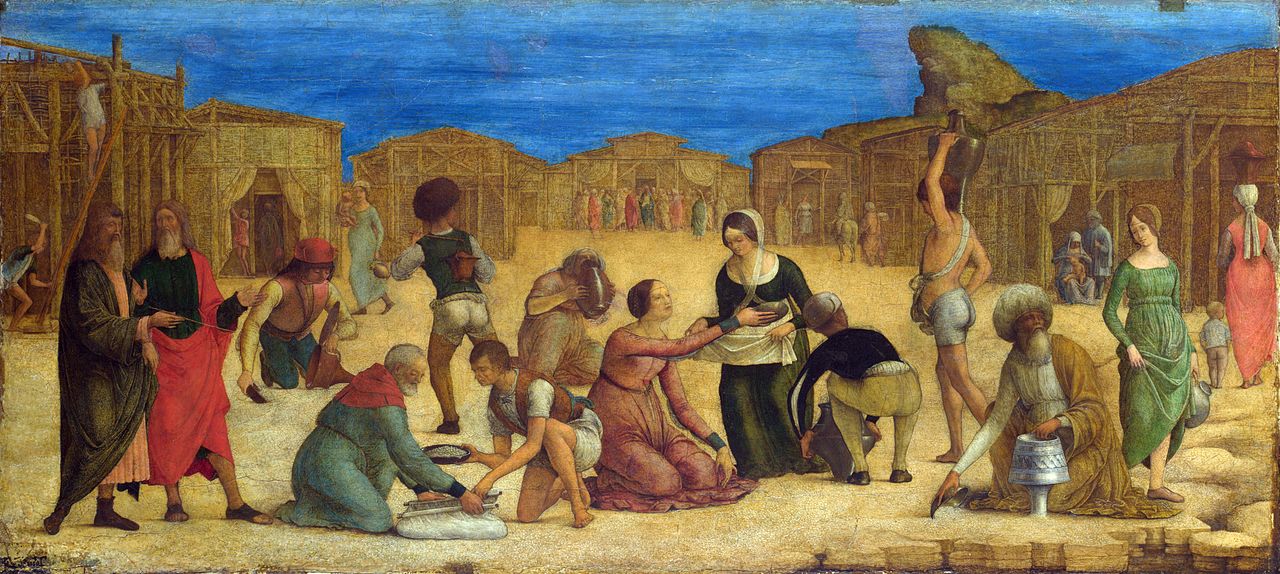Epilogue to the Manna Story/1/en
Epilogue to the Manna Story
Introduction

Expanding the Time Frame
The bulk of Shemot 16 provides a log of the amazing events of the first week of the miracle of the manna: its raining down from the heavens on regular weekdays, the double portion of manna collected on Fridays, and its complete absence on Shabbat. The conclusion of the chapter, though, moves on to discuss events relevant only for the more distant future:
(לב) וַיֹּאמֶר מֹשֶׁה זֶה הַדָּבָר אֲשֶׁר צִוָּה י"י מְלֹא הָעֹמֶר מִמֶּנּוּ לְמִשְׁמֶרֶת לְדֹרֹתֵיכֶם לְמַעַן יִרְאוּ אֶת הַלֶּחֶם אֲשֶׁר הֶאֱכַלְתִּי אֶתְכֶם בַּמִּדְבָּר בְּהוֹצִיאִי אֶתְכֶם מֵאֶרֶץ מִצְרָיִם. (לג) וַיֹּאמֶר מֹשֶׁה אֶל אַהֲרֹן קַח צִנְצֶנֶת אַחַת וְתֶן שָׁמָּה מְלֹא הָעֹמֶר מָן וְהַנַּח אֹתוֹ לִפְנֵי י"י לְמִשְׁמֶרֶת לְדֹרֹתֵיכֶם. (לד) כַּאֲשֶׁר צִוָּה י"י אֶל מֹשֶׁה וַיַּנִּיחֵהוּ אַהֲרֹן לִפְנֵי הָעֵדֻת לְמִשְׁמָרֶת. (לה) וּבְנֵי יִשְׂרָאֵל אָכְלוּ אֶת הַמָּן אַרְבָּעִים שָׁנָה עַד בֹּאָם אֶל אֶרֶץ נוֹשָׁבֶת אֶת הַמָּן אָכְלוּ עַד בֹּאָם אֶל קְצֵה אֶרֶץ כְּנָעַן.
(32) And Moses said: 'This is the thing which the Lord hath commanded: Let an omerful of it be kept throughout your generations; that they may see the bread wherewith I fed you in the wilderness, when I brought you forth from the land of Egypt.' (33) And Moses said unto Aaron: 'Take a jar, and put an omerful of manna therein, and lay it up before the Lord, to be kept throughout your generations.' (34) As the Lord commanded Moses, so Aaron laid it up before the Testimony, to be kept. (35) And the children of Israel did eat the manna forty years, until they came to a land inhabited; they did eat the manna, until they came unto the borders of the land of Canaan.
When did these events take place, and at what point were these verses recorded?
Cessation of the Manna
Verse 35 and its description of the forty year duration of the miracle of the manna is the classic example used to prove that the Torah sometimes appends information which happened only significantly later so as to complete a story.1 Interestingly, this verse might even refer to events which go beyond the fortieth year, as it speaks of eating the manna until the nation's arrival at both "אֶרֶץ נוֹשָׁבֶת" ("inhabited land") and "קְצֵה אֶרֶץ כְּנָעַן" ("the border of the land of Canaan"). What is the relationship between these two terms; do they both refer to the land of Arvot Moav (east of the Jordan), both to Israel proper, or do they split between the two? If the terms mean the same thing, why the doubling? If not, when exactly did the manna cease? Is the Torah speaking here only about events which took place in Moshe's lifetime, or also about those which happened after Moshe's death and the crossing of the Jordan?
Preserving the Manna
It appears that at least part of verses 32-34 is also out of chronological order. Verse 34 speaks of Aharon's preserving of an omer of manna by storing a jar of it "לִפְנֵי הָעֵדֻת", a term used in the Torah2 to describe the place of the Ark of Testimony ("אֲרוֹן הָעֵדֻת") and the Tablets of Testimony ("לֻחֹת הָעֵדֻת") contained therein. At this point, however, the Tabernacle and Ark had not yet been built, seemingly placing this event no earlier than the second year.3 Here, too, though, the extent of the achronology is unclear:
- Did this occur immediately after the construction of the Mishkan, or only at some later point? When would have been the most logical time to have set aside the manna – when the phenomenon first began, when there was a proper place for safe-keeping, or perhaps only on the eve of the nation's entry into the land, when it became necessary to commemorate the soon to be ending miracle?
- Are Moshe's instructions in verses 32-33 communicated at the same time as their fulfillment in verse 34?
- Moshe's directive speaks of placing the manna "לִפְנֵי ה'". Does that term have an identical meaning to "לִפְנֵי הָעֵדֻת" and speak of the same event? Or is it possible that the terms have distinct meanings and that the manna was placed in different places at different times (one of which might even have perhaps preceded the Tabernacle's construction)?
When was the Epilogue Written?
In addition to the questions regarding when the events occurred, we must also consider the question of when the verses of the epilogue were recorded. Did Moshe, in the first year, prophetically write the entire chapter including its appendix even before some of these events transpired, or did he write about these events only after the fact?4 Was Moshe, already in the first year, privy to the information that the Children of Israel would spend forty years wandering in the wilderness because of the Sin of the Spies? If verse 35 describes events that took place after the crossing of the Jordan, does that suggest that Moshe wrote also about events that took place after his death?